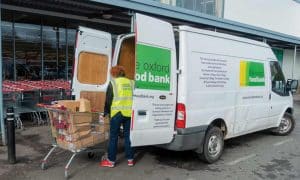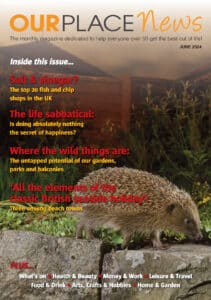Food aid charities finding it impossible to replenish stocks ask retailer to bypass restrictions

The Guardian reports that major UK supermarkets have been asked to set aside supplies for food banks after a tumultuous few days in which several emergency food aid charities closed and others struggled to meet rocketing demand from people hit by the fallout from coronavirus.
Many food banks said they were finding it impossible to replenish food stocks, even as thousands more people turned to them for help, and others said they had been overwhelmed as hundreds of elderly volunteer regulars were forced to go into self-isolation.
“The emergency service food banks provide is being severely compromised by lack of donations, rationed access to supermarkets, the vulnerability of volunteers and a rapidly increasing need for help,” said Sabine Goodwin, the coordinator of the Independent Food Aid network (Ifan), which represents about 40% of UK food banks.
Ifan has written to supermarkets asking them to allow emergency food aid providers to bypass restrictions which limit each customer to buy just three of each product, and to set aside online delivery slots for charities. Some food banks spend thousands of pounds a month on supermarket deliveries but can no longer get slots.
At least six independent food banks are known to have closed down in the past few days and there are warnings that for many more it will become unsustainable to keep operating unless the government takes action to head off a surge of people turning to food banks for help by making welfare benefits more generous and easier to get.
In addition, two food banks from the 426-strong Trussell Trust food bank network have announced they are to shut their doors. Islington food bank will close on Monday after running out of food and volunteers, and Knottingley food bank in West Yorkshire shut down after its food supplies were stolen during a break-in.
Emma Revie, the chief executive of the Trussell trust said: “Wide-ranging conversations are under way with national partners, exploring how we can work together to help ensure people can access support in the coming weeks, how we get vital food to the places it’s most needed, and how we can help boost volunteer numbers in areas where extra volunteers may be needed.”
There are about 2,000 food banks in the UK, most having sprung up in the last few years in response to benefit cuts and restrictions on social security. Many already struggle to keep on top of demand from people left penniless by long waits for universal credit payments.
Kirkcaldy food bank in Fife, which gives out up to 1,200 food parcels a month, felt the first tremor at the start of the week, when government guidance on self-isolation meant more than two-thirds of its 146 strong volunteer team – aged over 70 or with underlying health issues – were forced overnight to stay at home.
Then came the supply shock. It usually spends £10,000 a month on online deliveries from local supermarkets. But massive panic-buying meant it could not get a slot. “It’s been stressful,” says the food bank chair, Joyce Leggate. “We had to send volunteers rushing round cash-and-carrys to try and find supplies.”
Leggate, a retired NHS midwife, said that as demand rose, food stocks would become increasingly harder to come by. Food parcels have been given out lacking the usual staples of UHT milk, meat, coffee and tea, all of which have become hard to source.
(Story source: The Guardian)

